|
The following article appeared in Human Life Review, Summer 2012. Copyright © 2012 by Mary Meehan. 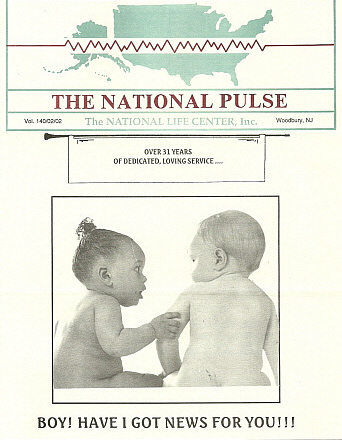 How Pregnancy Centers "Love Them to Life" Mary Meehan "Denise, you better come and get this kid! I can't be a mother anymore!" That's what Denise Cocciolone heard when she answered the phone decades ago when the New Jersey pro-lifer was new to pregnancy counseling. (Later she served as the Birthright USA director for years; now she heads a smaller network of pregnancy centers called 1st Way.) Cocciolone recalled that Betsy, in her late teens, had been a traveling hippie. Months earlier, she had "come back with a knapsack on her back"--and pregnant. With support from the Birthright center where Cocciolone worked and a host family, she had decided to release her child for adoption. Betsy, though, was hard to work with and had a huge conflict with her adoption caseworker. Changing her mind, she decided to keep her child, but her mothering effort lasted for two weeks. Although it was late on a Friday afternoon when Betsy called for help, Cocciolone found a volunteer who could care for the "beautiful little boy." Betsy went through counseling with another adoption agency; this time, adoption was completed. On another occasion, one of Cocciolone's telephone counselors obtained quick police aid for a pregnant woman threatened by her boyfriend. The woman was in a phone booth in Baltimore, after midnight, while the counselor was in Oregon. Cocciolone recounted that the counselor could hear the boyfriend "actually trying to beat her" during the phone call. The counselor told her, 'Pretend that you're still talking to me; I'm going to another phone...' She got word to the Baltimore police from the other phone, then returned to the first line, where she kept talking to the woman "and heard the police come and get the guy." This article describes pregnancy centers in the United States today, their strengths and weaknesses, and how they might be more effective. While their work at times is draining and even heartbreaking, many find it deeply rewarding as well. Janet Durig heads the Capitol Hill Pregnancy Center in Washington, D.C., where most clients are African American. She previously worked in education and insurance. After eight years at her Capitol Hill post, she said: "I hope I die here. I hope I have a ton of energy and I can stay here for a long time. I really do. It's wonderful work to do and wonderful people to work with." A Bit of Background The late Canadian pro-lifer Louise Summerhill started a pregnancy center in Toronto in 1968. Believing that "abortion is entirely destructive," she wanted to help both women and their unborn children. She started what became the large network of Birthright centers while taking care of her own seven children. "No mother ever delivered a more 'unwanted child,'" she wrote later of Birthright, "nor tried harder to rid herself of what seemed an intolerable burden."(1) But deliver it she did, and she nurtured it carefully for many years, both in Canada and elsewhere. Birthright now has about 280 centers in the United States.(2) Terry Weaver, the Birthright USA director, told me that being a Birthright counselor is "almost like being a new best friend." Besides helping young women through pregnancy, counselors encourage them "to improve their lot in life" through more education or vocational training. They refer many clients to community agencies for help. "We refer out," said Weaver, "but then we call them and find out...'Did you go? What kind of help did you get? Do you still need something?'" Birthright stresses the personal touch and a positive approach. Explaining its policy against use of graphic abortion pictures, Weaver said: "We're told to love one another. That doesn't mean scare them to life. It means love them to life." In her 70s and still going strong, she continues to do some counseling in the Atlanta building that the national Birthright office shares with the local Birthright center.  Robert J. Pearson, a building contractor in Hawaii, fought hard but unsuccessfully against legalization of abortion there in 1970. He offered publicly to support any pregnant woman who needed help. Enough women accepted his offer--about 40 in the first year after legalization--that he added extra rooms to his family's home to accommodate everyone.(3) He also opened some pregnancy centers in Hawaii. Later he moved to the mainland, where he opened many more. In a manual on how to start centers, he urged placing a center close to an abortion clinic, preferably in the same building. He suggested using a name that seemed neutral or even pro-abortion, such as "Pregnancy Problem Center." He explained that "if the girl who would be going to the abortion chamber sees your office first with a similar name, she will probably come into your center. The best part of this is that the abortion chamber is paying for advertising to bring that girl to you." In cases where a woman telephoned the center and asked if they did abortions, he advised not answering the question but, instead, taking control of the conversation by asking questions such as "Have you had a pregnancy test?" and persuading her to come to the center. As an alternative, he suggested saying, "Anything you need, we do here."(4) Pearson operated for years from St. Louis, then later from Arkansas, where he still lives at age 82. He may have opened as many as 300 centers over the years, but doesn't know how many there are now. "Many of them have closed," he said, "and many of them have opened other centers..." Abortion groups have launched major attacks on "fake clinics" over the years. Often the attacks have tarred all pregnancy centers with the Pearson brush--an issue I will return to later. Heartbeat International had an unusual combination of founders: Dr. John Hillabrand, an obstetrician; Sister Paula Vandegaer, a Catholic sister and social worker; and Lore Maier, a woman whose pro-life convictions had been forged by the hard experience of growing up in Nazi Germany. Established in 1971, the federation has grown to include over 900 pregnancy centers and clinics--plus some maternity homes and adoption agencies--in the United States and many centers abroad. Heartbeat describes itself as "Christ-centered," but is not affiliated with a specific church.(5) There is much emphasis on prayer at its conferences, and counselors are encouraged to share a religious message with clients. Heartbeat now focuses especially on urban and minority areas, helping existing centers there and starting new ones. In a 2011 history of her group, Heartbeat President Margaret Hartshorn emphasized: "In the United States, most abortions are performed in the heart of our major cities (our "NFL cities"). Most pregnancy centers, however, are located in mid-sized cities, small towns, and rural areas." When she met with center leaders in New York City 15 years ago, she learned that Yellow Pages advertising there "was so costly that only a couple of the centers had one-line ads." Heartbeat helped the centers with training and persuaded all of them to join an advertising campaign. The result was full-page ads in every Yellow Pages directory in the city, placing the centers "in competition, for the first time, with the New York City abortion clinics."(6) In Boston, she worked with Rev. John Ensor, an evangelical pastor who started with one small center and expanded to five. She said both Protestants and Catholics supported Ensor's effort "as volunteers, staff, and board members, prayer partners, and financial partners who pledged $1.00 per day (the cost of a cup of coffee at that time!) ..." Ensor later took on Miami, which had 37 abortion clinics and some struggling pregnancy centers. First he made several visits to the area, "setting up an office each time, with his laptop, in Panera Bread." Then he and his wife moved to Miami, where he established two new centers--one in an African American area and the other in a Latino community. He gave many talks at evangelical churches, urging them to be Good Samaritans by supporting the centers. After his talk at one church, a woman approached him and admitted that "I was part of the problem--my mother and I ran one of the abortion clinics in Miami for several years." But she added that "now I want to be part of the solution." She became the director of Heartbeat's Latino center in Miami.(7) Hartshorn is increasing the number of minority leaders in her network. She wrote that "about 30 percent of all presentations at the Heartbeat International conferences are now given by Latino and African American leaders." Such leaders, she said, "can and will take back our major cities for life."(8) 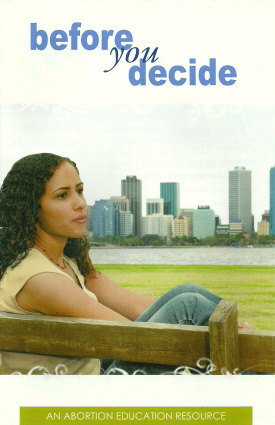 The Christian Action Council, founded in 1975, was the first major pro-life group of evangelical Protestants. It brought a much-needed voice to the public debate on abortion and also lobbied on Capitol Hill. The Council started many pregnancy centers around the country, increasing them rapidly in the 1980s and '90s. Eventually deciding to focus exclusively on the centers, the group changed its name to Care Net. It now has more than 1,100 centers and clinics around the U.S.(9) Its leaders, true to their faith tradition, have always seen evangelism as part of their mission. Centers that affiliate with the group--and their board members, directors, and volunteers--all must agree with its statement of faith.(10) How does evangelism affect clients who are Jewish or Muslim? Care Net President Melinda Delahoyde said there is nothing in the counseling "that would be offensive to their faith tradition in any way." Care Net partnered for years with Heartbeat to run Option Line, a national pregnancy counseling hotline. Now Heartbeat runs Option Line, while Care Net has a new online counseling center called Pregnancy Decision Line. Like Heartbeat, Care Net is opening more centers in urban and minority communities. Rev. Dean Nelson, an African American staff member, leads the Care Net effort. He holds "Leaders for Life Summits" for black pastors, bishops, and other community leaders to tell them about "the desperate situation within the black urban communities regarding abortion" and to "engage them to really be advocates for life." Concentrating on five cities at a time, Rev. Nelson works with community leaders to open new Care Net Centers. The national Care Net provides training and often gives start-up grants as well. New Centers have opened--or should open soon--in Atlanta, Detroit, Hartford, New York, Philadelphia, Richmond, and Washington, D.C. Janet Durig's Capitol Hill center, a Care Net affiliate, has trained volunteers for the projected new center in Washington. Elsewhere, Rev. Nelson told me, some existing centers see a new one as "a little bit of a threat." He said that's "unfortunate, because the situation, in our opinion, is desperate and is dire." He said Care Net plans "to have, in the next three years, a thousand black and Latino leaders to be proponents and champions for life--specifically highlighting the value of pregnancy centers." Attorney Thomas Glessner started and led several pregnancy centers in Seattle during the 1980s, then served as president of what is now Care Net. Keenly aware of attacks on pregnancy centers and their need for good legal advice, he started the National Institute of Family and Life Advocates (NIFLA) in 1993. This group provides legal audits and advice to member centers. Almost 1,250 centers belong to NIFLA, and nearly 800 of them now qualify as medical clinics. The clinics provide ultrasounds, which often convince women they should not have abortions. Some also provide testing for STIs (sexually-transmitted infections). A handful, Glessner said, provide "not full prenatal care, but at least a few follow-up appointments with a doctor." Strongly encouraging older centers to become clinics and offer ultrasound, NIFLA runs regular ultrasound training sessions for doctors and nurses. 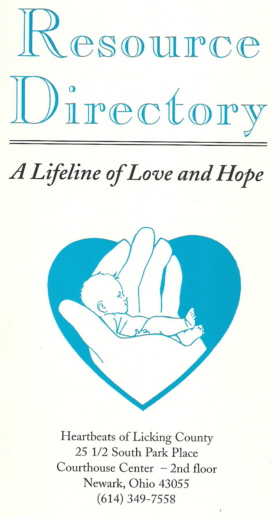 Many centers belong both to NIFLA and to Heartbeat and/or Care Net as well. Those networks are the Big Three of the pregnancy-center movement and often work together. Birthright centers, though, generally affiliate only with Birthright, which runs a tight ship and sails alone. Counseling: The Heart of the Work Good counseling always involves a great deal of listening. Heartbeat encourages counselors to use open-ended questions and to say, "Tell me more about..." It advises asking the woman not only about her needs, but also about her strengths.(11) Birthright's Terry Weaver remarked: "Actually, if you do it right, I think you're helping her solve her own problem." Virginia Clise, director of the 1st Way center in Cumberland, Md., deals mainly with women in their teens or twenties who live in a white, working- class neighborhood where many clients are on welfare. Most do not want abortions, but need practical help and moral support. Some face pressure to have abortions from families or boyfriends. Her clients, Clise said, are "scared to death. Many of them are believing that their life is over because they are pregnant.... And they need someone to love them, to give them confidence." Her approach is: "Yes, your old life is over. That's true. But let's build a new life." She refers them to social service agencies for coverage of prenatal care, access to the WIC food program, and other assistance. She encourages older ones who lack high-school diplomas to take classes that will qualify them for a general equivalency diploma (GED). She also encourages attendance at the local community college. Clise describes her center as Christian-based and sometimes assures a client who is worried about something that the Lord will "take care of that for you." She does not press religion on clients, but is happy to speak of faith matters when asked. Jenny Summers directs the Pregnancy Resource Clinic, a Care Net affiliate in State College, Pa., near the main Penn State campus. She said that when students have "never experienced the joy of raising a child...it's hard for them to make that choice. They know what it's like not to have them, and they'd rather keep it that way." A student also worries that her parents 'are gonna kill me' when they find she is pregnant. Summers commented: "We encourage them not to tell their parents through text message--which this generation just wants to do." Sometimes a student calls her parents from the counseling room, where she has back-up support. When their response is negative, Summers urges a student to give them a few weeks, predicting that their hearts will soften. She said they usually do. Some parents, though, say, 'I'm not gonna pay for your school anymore. I'm not gonna pay for your apartment if you don't have an abortion.' In such cases, Summers tells the young woman that, under the law, no one can force her to have one. She also says, "You know, this baby's created by God, and God is ever so near to you now.... This is when you need him the most." Sometimes counselors have to talk to clients about the effects of substance abuse on unborn children. Virginia Clise remarked that "a lot of these girls smell like a chimney and tell me they don't smoke. But that's okay." She has a video to show them: Stop Smoking Now. The local drug treatment center sends her pregnant women who have been on cocaine or heroin and are now on methadone. Clise explained that "they do not want the mother to go cold-turkey when she's pregnant, because that will probably kill the baby. So that's why they put her on the methadone." After delivery, "hopefully, then, she will get drug-free." Some of the babies, meanwhile, "have to go through withdrawal from the methadone." At Penn State, binge drinking of alcohol is a major problem. Some young women, Jenny Summers said, are two boyfriends "removed from the guy that they got pregnant by." The father of the child "was just a friend"--except that "she doesn't even know his last name...they were drunk and were at a party or whatever." Summers acknowledged that sometimes, especially when she knows her efforts to save a life have failed, "I get really sad. I do grieve." Contrasting the way society devalues life with her own children's great joy of life makes her "passionate about what we do. And I love what we do, and I can't imagine doing anything else." Other Assistance Pregnancy centers usually provide direct assistance that may include free baby clothes, maternity clothes, formula, and diapers. Some give away baby furniture as well. Some items are brand-new, others lightly-used. The Capitol Hill center in Washington has a whole room devoted to baby and toddler clothing; it also provides children's books. "We've seen changes in lives because we walk with people for a long time," center director Janet Durig remarked. Birthright centers provide clothing, but Terry Weaver said too much emphasis on it means that "you're inundated with baby clothes and you don't have the abortion call." Some Birthright centers used to provide clothing up to school-age, but "we've asked them just to give out infant clothing...maybe up to 24 months." 
Many centers now have "Earn While You Learn" programs, in which young mothers earn credits or coupons by watching and discussing videos on parenting skills. They can then use their credits to "buy" items ranging from a diaper bag to a bassinet or portable crib. Virginia Clise has such a program in her 1st Way center. Her many videos, obtained from Heritage House '76, cover "Bonding with Your Unborn Baby," "Infant Massage," "Crying, Colic, Sleep," and much more. Some centers have pregnancy and parenting classes where clients watch and discuss videos together, but Clise does video instruction one-on-one. One of her programs has questions about the client's problem areas and what she wants to accomplish in the next one or two years. Clise reported that many clients "just look at me. They never really thought about this." And some say they have no strengths. She responds, 'Oh, yes, you do' and helps them find at least one. In their early years, many pregnancy centers had volunteer families to host young women who had been ousted from their own family homes because they were pregnant. This is no longer common, partly because some women had drug or other problems that host families couldn't cope with. Terry Weaver said some "would run up telephone bills--hundreds of dollars--and remove things that were not theirs." Many centers now refer women in need of housing to maternity homes or other group homes. These work well for some, although Weaver remarked that today "girls don't like to go to places where there are rules." Sometimes their need for housing is only temporary: "A lot of times, it's 'I'm mad at my mother. I can't stand speaking to her anymore, and I'm not gonna stay there.' But when you explain to her that 'you're lucky to have a place,' often they can work that out." Sometimes parents and daughter come to a center together, and the counselor helps them "bring things out in the open" and "say things that they feel but they're not saying out loud to each other." Other center programs often include abstinence education and abortion healing. There is also much mentoring, formal or informal, by staff and volunteers, who include many mothers and grandmothers. How do centers pay for everything they do? Donations from individual supporters are a top source, and many have local churches that donate on a regular basis. Jenny Summers said about 50 churches help her center, some with monthly or quarterly donations. Businesses, she said, make donations at fundraisers or provide "a service rather than money." The Knights of Columbus give both money and volunteer support to pregnancy centers. Denise Cocciolone said Knights raised nearly all the money--and also provided skilled volunteer work--to expand the building that houses both 1st Way's national office and its Woodbury, N.J., center. The Knights, she said, "were fantastic." Both the Knights and Focus on the Family make grants to centers for ultrasound machines. Special events also help many centers: an annual banquet, a walk for life, a baby-bottle campaign (asking people to fill baby bottles with coins), a scavenger hunt, a golf tournament. 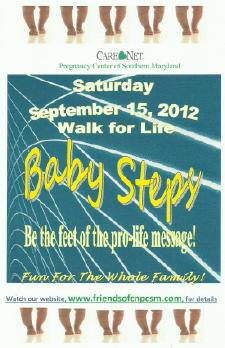 Some centers receive state funding through "Choose Life" license plates or other state programs. Care Net allows its centers to receive such money, but President Melinda Delahoyde said the group warns them, "Look at the strings attached. Look at the reporting mechanisms.... And, also, realize that you cannot come to depend on this money." Peggy Hartshorn, the Heartbeat president, said her group also warns its affiliates about dependency. But she added that state agencies that administer funding "have been very supportive" of the centers and are "sympathetic to the mission." Terry Weaver of Birthright spoke against government funding, saying that "we don't want somebody coming in and telling us what to do." Denise Cocciolone of 1st Way, worried about dependency and control, said that "we strongly recommend against any government money." Where Are the Guys? Sometimes a client tells Janet Durig that her boyfriend hasn't talked to her "since I told him I thought I might be pregnant." When a young woman tells Jenny Summers that her boyfriend will "support me whatever I decide," Summers responds: "Usually, that means 'I'll pay for the abortion.'" Then, Summers said, "they just look at me--like, how did I know that?" One girl told Virginia Clise that her boyfriend ordered her to have an abortion and said he would provide the money. "And I told him that I didn't want to get that abortion. And he said, 'Well, as far as I'm concerned, that baby's dead anyway.'" Women who resist such pressures for abortion often are forced to rely on welfare. Relatively few men come to centers with their girlfriends or wives. The fact that visible center staff and volunteers are overwhelmingly female may have something to do with that. Substantial numbers of men serve as board members or do painting and repair work for center buildings, but clients usually don't see them. Some centers, though, do have male counselors available to talk with men. Denise Cocciolone has had some who were very good in counseling young women as well. One, the father of several daughters, was "kind and gentle and loving and really very fatherly to them," she said. He was doubly important to many because he was the first "decent father figure" they had ever known. Care Net and Heartbeat worked in recent years with the National Fatherhood Initiative (NFI), a group that receives both private and public funding, to improve outreach to men. Care Net's Melinda Delahoyde said this involved actually placing "fatherhood coordinators" in pregnancy centers. Margaret Hartshorn said many Heartbeat centers received NFI material and started fatherhood programs. While the federal government made major grants to NFI under the George W. Bush administration, she noted that funding "has dramatically declined" under President Obama. Helpful NFI material, though, is available for purchase at the NFI website, www.fatherhood.org. Janet Durig has used NFI literature at her Capitol Hill center in Washington. The center also encourages young fathers to attend its childbirth classes along with the young mothers. Durig said 40-60 teenage fathers attended over a two-year period and were staying active in their babies' lives. One childbirth class had a reunion at the center, "and they all brought their babies." Fathers were "showing off their babies to the other boys...and then cooing and cuddling...and just complimenting them over their children." The center encourages dads to attend parenting classes, too. Although center websites are directed mainly toward women, some have added men's pages. In comparing a men's page from South Dakota with one from Louisiana, I found useful advice on both. But one said that it's "normal to have feelings of anger, frustration and fear" about a pregnancy, and the other added "disappointment" to the list. I was surprised that neither said anything about happiness in having a child. The Louisiana one, though, did include this point: "SHE'S carrying the baby, but you are BOTH parents. You have an obligation to love and support that baby..."(12) 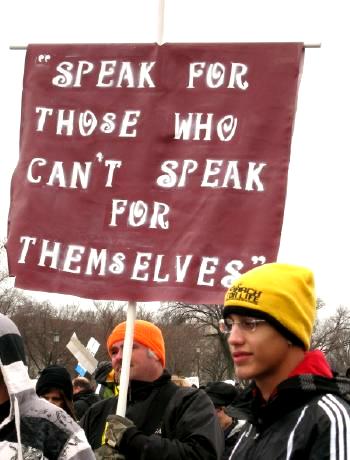
I believe both pregnancy centers and the entire pro-life movement will take a great leap forward if more male pro-lifers--especially pastors and politicians--tell other men: "This is not just a women's issue! Step up to the plate, guys! These are your children, too. That doesn't mean just financial support--though that's important--but also being there for your children. And if you do it right, you will find that fatherhood is one of the great joys of your life." If they say this publicly and often, millions of women will shout "Amen!" "Integrity" Is a Many-Splendored Word Pregnancy centers are bad for the business of Planned Parenthood (the largest single abortion provider in the U.S.) and the National Abortion Federation (a trade group of abortion clinics). Both PP and NAF have attacked the centers bitterly. So have NARAL Pro-Choice America and some of its allies in Congress. The common approach is to imply that most or all pregnancy centers are highly deceptive; to contend that centers make up or exaggerate the adverse effects of abortion on women; and to quote reports from undercover agents who, posing as pregnant women, call or visit centers. In at least one attack and part of another, though, charges cannot be checked because the centers allegedly at fault are not even named. That is an odd practice, to say the least.(13) Some of abortion's effects on women, both physical and mental, are highly disputed. People on both sides of the abortion divide are tempted to cite mainly those studies that support their cause. I believe some pregnancy centers do exaggerate some adverse effects. Statements about them should focus on the most common ones and cite recent medical studies. Sometimes a center should go further: When an abortion clinic in its area has been sued successfully over injury or death due to malpractice, it's a public service to mention this and cite court records. Pretending to be an abortion clinic is not nearly as widespread as some attacks suggest. But it shouldn't happen at all. Robert Pearson has spent over half of his long life in the defense of unborn children. No one can question his deep commitment. Some younger leaders, also deeply committed, rely on market research about "abortion-prone women" to justify websites that suggest their centers are neutral on abortion. I believe the deception approach is a great mistake, both ethically and practically. It undermines the trust that holds society together, and it gives bad example to young people. It harms the reputation of all pregnancy centers and of the pro-life movement generally. It leads to diversion of time and money from positive programs to defending centers against media attacks and hostile legislation. It also places an unfair burden on staff and volunteers; most of them, after all, were brought up to tell the truth. If an inquiring woman "pinned us right down" on whether a center does abortions, Pearson told me, then "we'd have to say, 'Well, no, we don't.'" Why not say that upfront? Here's what Terry Weaver suggests: "No, we do not do abortions. But we've got lots of information I bet you haven't seen that we could talk to you about. There's no pressure... Free. Confidential. Don't even need to know your name if you don't want to tell me. And I bet you we could give you some information you might find helpful while you're making your decision." Birthright, Care Net, Heartbeat, and NIFLA are all on record against deception,(14) and many centers now say on their websites that they neither perform nor refer for abortions. Many leaders, though, believe it's all right to divert the inquirer's attention-- at least initially--by asking questions and inviting the woman to visit a center. If a woman learns right away that a center doesn't do abortions, they fear, she will simply hang up. Undoubtedly, some women will. But when the person who answers the phone is courteous and friendly, this is less likely to happen-- especially now, when people are tired of answering machines and voice mail. Many are delighted to find a real human being at the other end of the line, especially one who is friendly. I think centers should either answer the abortion question the first time, or else allow only one attempt at diversion. Repeated failure to answer a simple question is rude to the point of really annoying people. The practice may remind them of high-pressured, flimflam sales talks. Some centers virtually fly a pro-life banner with their names; but many use names, such as "pregnancy resource center," which are more neutral-sounding yet also accurate. But centers with names such as "Woman's Choice Services" or "Pregnancy Choices" should ask themselves if those names aren't too clever by half. Some centers should also wonder if their efforts to appear neutral on abortion may be changing their own outlook on life and confirming and even spreading attitudes they thought they opposed. Thus an Idaho center says on its home page: "Are You Pregnant? You had plans. A baby wasn't one of them. If you're considering an abortion, you may not even need one." Need one? (It explains that possibly the woman is not really pregnant.) Responding to the question, "How far along am I?" it says: "How far along you are will determine what kind of abortion procedure you would be eligible to receive..." But its "About Us" page says, "We do not offer, recommend or refer for abortion or abortifacients..."(15) A woman who gets that far may wonder, "Well, why not?" Attacks on pregnancy centers from the abortion industry and its political allies are unfair in many respects. But some centers do send mixed messages, and some really are deceptive. Leaders of those centers should ponder what Richard Nixon said about the way his enemies used the Watergate scandal against him: "I gave them a sword, and they stuck it in and they twisted it with relish. And I guess if I had been in their position, I'd have done the same thing."(16) National leaders, besides correcting centers affiliated with their own networks, can try to reason with leaders of centers that are not. They can publicly repudiate any who persist in deception. Many center websites feature photos of young women who look worried or upset. I don't know whether this is an effort to stress the need for counseling, to appear neutral or, as one veteran counselor suggested, because that is how women appear "when we get them." But it would be good to balance such photos with ones of happy parents with their children. More sites should also include testimonials from women and couples helped by centers. There are lots of success stories out there, and they can add a great deal to websites and to printed literature as well.  Sometimes the success stories--in person and years later--stop by a center to thank a counselor. Terry Weaver remembers a young woman who stopped by one day to say that her child "was six and that her life was good. She had a good job; she'd finished school...everything was a positive thing. And that's just what keeps us here, you know? That's our paycheck." She also remembers a boy who found out, at age 12, that he was alive because of her counseling. The boy "wanted to come and meet me." It was "an awesome moment in my Birthright life, to have that young fellow come in." Author's Note Where quotations are not cited to notes, they are from one of the
following interviews by the author. Most were telephone interviews, but the
Clise, Durig, and Summers interviews and the first Cocciolone interview were
onsite: Notes 1. Louise Summerhill, The Story of Birthright, rev. ed. (Toronto: Birthright International, 2006), 3. 2. This and later figures on networks' affiliates are based on checks with the networks in May and June, 2012. 3. Patricia G. Steinhoff and Milton Diamond, Abortion Politics: The Hawaii Experience (Honolulu: University Press of Hawaii, 1977), 32-34, 187-89, & 226, n. 19. 4. Excerpts from Robert J. Pearson, How to Start and Operate Your Own Pro-Life Outreach Crisis Pregnancy Center (St. Louis: The Pearson Foundation, n.d., 4-5 & 18), appended to "Statement of Ann E. Menasche, Attorney for Committee to Defend Reproductive Rights...before the Subcommittee on Civil and Constitutional Rights" [U.S. House, Committee on the Judiciary], 15 Dec. 1986. 5. Margaret H. (Peggy) Hartshorn, Foot Soldiers Armed with Love (Virginia Beach, Va.: Donning Company Publishers, 2011), 17-36 & 58-65. Heartbeat was once called Alternatives to Abortion International. 6. Ibid., 66 & 69-71. 7. Ibid., 66-67 & 72-73. 8. Ibid., 73-74. 9. "History," www.care-net.org/aboutus/history.php. 10. "Care Net Affiliation Agreement," www.carenet.org/public/file server.php?id=798; and "Statement of Faith," www.care-net.org/ uploads/affiliation_docs/Statement-of-Faith-2-08-C.pdf, both accessed 7 June 2012. 11. Heartbeat International, "The L.O.V.E. Approach," a one-page handout, n.d. 12. See www.carenetprc.com/for-men.html (Care Net Pregnancy Resource
Center, Rapid City, S.D.); and www.nbrwhc.org/help/ 13. The Truth Revealed: North Carolina's Crisis Pregnancy Centers (Raleigh, N.C.: NARAL Pro-Choice North Carolina Foundation, 2011) does not name any of the centers it accuses. A 2006 congressional report failed to identify centers it accused of providing false information to callers who posed as pregnant teenagers. See U.S. House of Representatives, Committee on Government Reform, Minority Staff, Special Investigations Division, False and Misleading Health Information Provided by Federally Funded Pregnancy Resource Centers, 2006. 14. A Quick Reference Guide to the Birthright Charter and Directives Relating to the Charter (Toronto: Birthright International, 2007), 9; and A Passion to Serve (Washington: Family Research Council, [2009]), 67. 15. See www.realchoicesclinic.com (Real Choices Clinic of Coeur d'Alene), accessed 15 June 2012. I have seen the same wording on some other pregnancy-center sites. 16. Richard M. Nixon, interview by David Frost (broadcast in May, 1977), in
The Guardian, 7 Sept. 2007, http://www.guardian.co.uk/theguardian/2007/sep/07/greatinterviews1. |